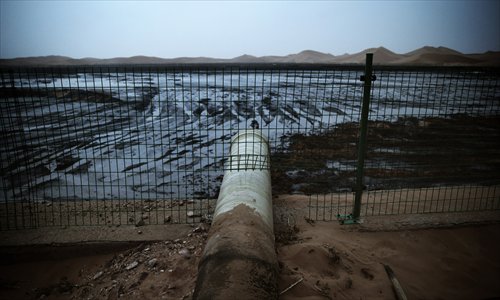Groundwater pollution calls for more cross-department govt efforts

A pipe is seen discharging waste water into the desert at an industrial park in Alxa, Inner Mongolia Autonomous Region on August 29, 2014. Photo: CFP
The Ministry of Land and Resources (MLR) recently released its 2015 survey results, which show that of its more than 5,000 underground water monitoring sites in 202 cities, the water quality at more than 60 percent is "bad" or "very bad."
The factors that led many of the sites to be substandard include excessive water hardness and elevated concentrations of manganese and sulfate. At some locations potentially harmful concentrations of arsenic, lead, cadmium and chrome were found in groundwater.
Compared with the previous year, water quality at more than 62 percent of the monitoring sites was stable, 17 percent were improving, while 20 percent were worsening, the report said.
Reports about polluted water resources are always alarming, and different government departments seem to have different responses.
In early April, a Ministry of Water Resources (MWR) report saying "80 percent of China's underground water is undrinkable" evoked great public concern.
The MWR later claimed that the media had misunderstood its report, which meant to say that 80 percent of the shallow layer of underground water was undrinkable, but the deeper layer of underground water, which is a major source of drinking water, was not that bad.
Among the country's 4,748 sources of drinking water, 1,817 are underground water sources, and about 85 percent of such sources meet water standards, the ministry said.
"In the water pollution report, the MWR looked at 18 provinces and regions in northern China where water pollution is more serious, but the monitored subjects were mainly shallow underground water," said Jia Shaofeng, deputy director of the water resources research center at the Chinese Academy of Sciences. "We are using less underground water for our drinking water now."
Ma Jun, director of the Institute of Public and Environmental Affairs, said many localities have been digging deeper to collect underground water because the shallow water is too polluted. "But it does not mean we don't have to worry about the quality of the deeper water," he said, adding that deeper underground water can also get polluted, and the amount of such water is limited.
Joint efforts
In 2005 the MWR and the MLR jointly applied for a national underground monitoring project. In 2014, the National Development and Reform Commission approved the project.
Technical issues are not a major problem, but rather how to deal with overlapping administrative functions and how to allocate different tasks, a source with the MLR told the media. The two ministries have their own standards of underground water monitoring.
However the two ministries have been trying to clear hurdles in pushing forward the joint project.
The MLR stopped requiring water resources departments to make land use applications when digging wells for underground water monitoring. In return, the water resources authorities stopped making land resources departments apply for well-digging licenses.
Challenges
In 2011, the Ministry of Environmental Protection released a national underground water pollution prevention and treatment plan (2011-20). In 2012, the ministry announced that it planned to establish a preliminary underground water-monitoring network in North China by 2015. The network will be able to comprehensively monitor the region's underground water quality by 2020, and pilot projects to recover underground water will be established.
But experts said that the plans have not been carried out as hoped. Today, the country is still facing problems such as its incomplete legal system for water resources protection, weak capability in monitoring and managing underground water, lack of water treatment funds and lack of technology to clean polluted water.
Chen Fen, a law professor at Beijing Normal University, said the country is in need of a law to protect its underground water. The current Water Pollution Prevention and Control Law only stipulates general rules for underground water protection, but does not specify details and liability, so in reality it is not binding, she said.
An official with the Ministry of Environmental Protection said underground water pollution prevention is the environmental authority's responsibility, but underground water exploration and development concerns the water resources authorities and the Ministry of Housing and Urban-Rural Development. There are often conflicting interests between these authorities. These different government departments urgently need to establish an effective joint coordinating system, the official said.
Newspaper headline: Not a drop to drink